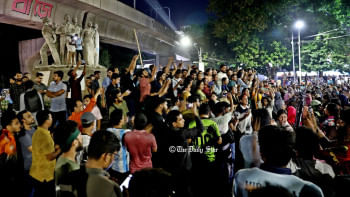Caught between two crises

After experiencing the worst load-shedding in a decade last year, we seem to be heading towards another sweltering summer, with no one the wiser about how to tackle the energy crisis. According to a report by this daily, independent power producers (IPPs) that use furnace oil risk facing severe shortage of fuel this year, unless they can import fuel worth $1.05 billion between March and June. In a letter sent to the Bangladesh Bank (BB), the Bangladesh Independent Power Producers' Association pointed out that due to a shortage of US dollars, their members have been unable to import heavy fuel oil (HFO), adding that the country's "energy security is at peril" without the central bank's support.
The BB is reportedly waiting for instructions from the government. The problem is, whatever the government decides, we, the people, are looking at a lose-lose situation. Given the severity of the dollar crisis in the country, it seems illogical to expect the government to approve an amount that is roughly one quarter of the IMF loan, when it should prioritise plants that require cheaper fuel, like gas. But with these IPPs making up as much as 27 percent of the total capacity of the country's grid, this would inevitably result in frequent power cuts. Meanwhile, even if these plants sit idle due to fuel shortage, the government will have to continue to pay them a huge amount as capacity charges.
Weren't we in this exact position less than a year ago, when fuel prices skyrocketed in the international market following the outbreak of the Russia-Ukraine war? Back then, we joined the experts in highlighting to the government the dangers of having relied on an energy policy that was so dependent on imports; we had implored it to move away from paying atrocious amounts of capacity charges to IPPs – a whopping Tk 90,000 crore in less than a decade – and coming up with short-, medium- and long-term alternatives that were sustainable, cost-effective and focused on building our national capacity.
Unfortunately, over the past year, we did not see any comprehensive plan for resolving the crisis, nor any acknowledgement of having learnt from the reckless policies that had pushed the country to such an insecure place in the first place. In fact, the new proposed Integrated Power and Energy Master Plan (IEPMP) endorses the decade-old policy of over-reliance on IPPs, foreign imports and foreign investments. In the absence of any meaningful reforms in the sector, it is only inevitable that the government will continue to find itself in such tricky situations from which there is no easy escape.
Thus far, the government has resorted to blaming external factors for the crisis, while passing down the cost of its own decisions to the public, even going so far as to curtail the Bangladesh Energy Regulatory Commission's right to hold a public hearing before any price increase. We urge the government to review its energy policies and finally clarify to the people what steps it will take to address the crisis and ease people's suffering.


 For all latest news, follow The Daily Star's Google News channel.
For all latest news, follow The Daily Star's Google News channel. 









Comments